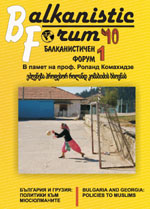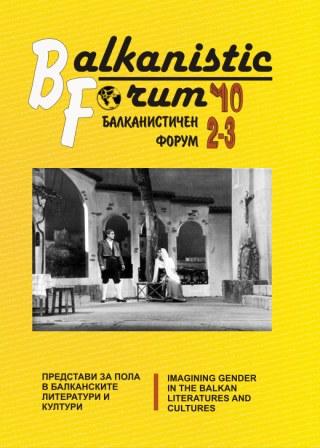
We kindly inform you that, as long as the subject affiliation of our 300.000+ articles is in progress, you might get unsufficient or no results on your third level or second level search. In this case, please broaden your search criteria.


The paper deals with the origin of the Eurasianism and the Turanism (Turkism) – two ideologies that arose almost simultaneously at the beginning of the XX century and have exerted significant influence on different social strata in Russia and Turkey. The accent is put upon the social ideas of their founders – Trubetskoy and Ziya Gokalp and the specifics of the political programs suggested by them. The final conclusion is that that the Eurasianism and the Turanism (Turkism) are two different models of social engineering aiming to modify the vast space of Eurasia and Anatolia.
More...





The peculiarity of the humanitarian knowledge is mainly reflected in its name (from Latin humanis). Unlike the natural sciences, which study the nature, the object of the humanitarian studies is the ’person’s world’. One of the most important criteria of scientific approach is the critical reflection about the own statements and conclusions, dialectical criticism, which sustained the enhancement and development of the study. The humanitarian education ill regulate the problem of the organization of the interpersonal conflictless communication by establishing the educational environment sustaining the person’s active involvement in the process of the acquisition.
More...



To analyze the gender policy of the Bulgarian Communist Party and state I used the statistics of 460 biographical questionnaire of the participants of the Unions of the Fighters against Fascism from Razlog and Petrich district of South-Western Bulgaria and 163 certificates of granting privileges to Union members and their families.
More...

My paper treats the official anniversary celebrations of prominent personalities in the Bulgarian culture during the 1920s-1940s. This practice, wide spread after the First World War, is based on anniversaries’ precedents in the end of the 19th century, on the state cultural policy and on the conceptions of Bulgarian intelligentsia during the interwar period. The paper compares these so called ‘personal anniversaries’ to the celebrations of historical events and of cultural institutions’ establishment. A particular stress is laid on the first anniversaries of few prominent women. My text comments the personal anniversaries as a cultural practice that has transformed the collective (national and cultural) memory and has created ‘canon’ in the social consciousness. On the other hand, my research analyses the personal anniversaries as an initiative that has been marked important social changes. Also these personal anniversaries have made visible some firm cultural stereotypes (for example, in the field of gender) and have imposed ‘policies of forgetfulness’ on exact personalities and on whole social groups.
More...
The funerals and the celebrations of the anniversaries of the deaths of the Serbian Prime Minister Zoran Gingic and the ex-president of Yugoslavia Slobodan Milosevic are taken up in the text as forms of institutionalization of honoring the memory of late politicians (the case of Z. Gingic) or imitation of the forms of state homage by political upholders (the case of Sl. Milosevic), after the refusal for institutionalization by the governing state circles. The post socialist period situation in Bulgaria is regarded as similar to the one in Serbia, although unburdened by the shadow of the crumble of politics and war. During that period many representatives of the political elite of the Socialism period were buried – one of whom is T. Jivkov (as an example of refusal for institutionalization of honoring his memory). Other eminent politicians of the transition period – A. Lukanov, P. Mladenov, L. Berov are buried with state honors. A very specific case is the funeral of the mummy of G. Dimitrov and the demolition of the Mausoleum. It is and example of the interference of the institutions in the transformation of one of the emblematic monuments for the Socialism period into a monument of forgetfulness.
More...
The research is directed to the outline of the inhabited by the human communities territory by the evidences of the toponymy and toponymic stories in the empiric example from the village of Izbul, district of Shoumen. The village space and its oral history are given a meaning by the family memory and the linear stories of inhabitationmovement- deportation.
More...